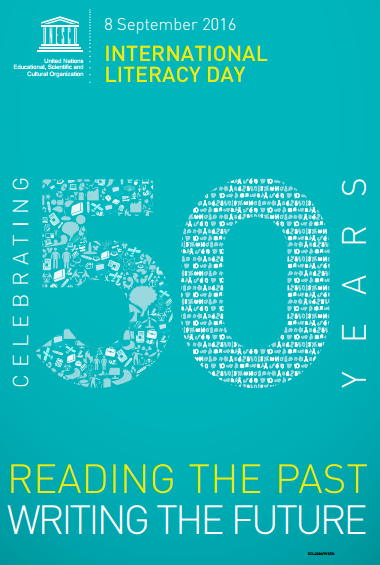Reading the Past, Writing the Future
"The world has changed since 1966 – but our determination to provide every woman and man with the skills, capacities and opportunities to become everything they wish, in dignity and respect, remains as firm as ever. Literacy is a foundation to build a more sustainable future for all."
Irina Bokova, UNESCO Director-General
Fifty years ago, UNESCO officially proclaimed 8 September International Literacy Day to actively mobilize the international community and to promote literacy as an instrument to empower individuals, communities and societies.
This year marks the 50th anniversary of International Literacy Day and UNESCO is celebrating it under the theme:
“Reading the Past, Writing the Future”.
"International Literacy Day 2016 celebrates and honours the past five decades of national and international engagement, efforts and progress made to increase literacy rates around the world. It also addresses current challenges and looks to innovative solutions to further boost literacy in the future."
Unesco
ILD 2016 infographic
credits: UNESCO
For 50 years, UNESCO has been celebrating International Literacy Day by reminding the international community that literacy is a human right and the foundation of all learning.
Now International Literacy Day is celebrated worldwide, bringing together governments, multi-and bilateral organizations, NGOs, private sectors, communities, teachers, learners and experts in the field.
"Illiteracy remains synonymous with exclusion and poverty -- we must turn this around."
Irina Bokova, message 2016
On this day also International Literacy Prizes are awarded to people with outstanding solutions that can drive literacy towards achieving the 2030 Education Agenda. This year the focus is on innovation.
This is the first year of implementation of the 2030 Agenda for Sustainable Development. In this context the vision of literacy is aligned with lifelong learning opportunities with special focus on youth and adults.
Goal 4
credits: Elyx Yak
Literacy is a part of Sustainable Development Goal 4, which aims to “ensure inclusive and equitable quality education and promote lifelong learning opportunities for all”. The target is that by 2030 all youth and a substantial proportion of adults, both men and women, achieve literacy and numeracy (SDG Target 4.6).
Education:
Literacy is a fundamental human right and the foundation for lifelong learning. It is fully essential to social and human development in its ability to transform lives. For individuals, families, and societies alike, it is an instrument of empowerment to improve one’s health, one’s income, and one’s relationship with the world.
Activities: some ideas
- Use any increased flexibility offered in the curriculum to respond to issues as they arise.
- Provide space for teachers and students to discuss and reflect on these issues.
- Pupils get a lot of their information about global issues from the media so help them to interrogate this information critically and consider a range of perspectives.
A good quality basic education equips pupils with literacy skills for life and further learning; literate parents are more likely to send their children to school; literate people are better able to access continuing educational opportunities; and literate societies are better geared to meet pressing development.
Ideas + :
- Use any increased flexibility offered in the curriculum to respond to issues as they arise.
- Provide space for teachers and students to discuss and reflect on these issues.
- Pupils get a lot of their information about global issues from the media so help them to interrogate this information critically and consider a range of perspectives.
Whether it’s reading or writing, literacy is an outlet to an untouchable world – our imagination.
Readathon:
- Host a friendly reading challenge to spark students’ interest. Encourage children to read as many books as possible during this month and have them track their progress. Their efforts can be sponsored by teachers, family and friends or by incentives created through school library, local libraries or bookshops.
- Invite a local role model or author to discuss the impact literacy has had on their lives.
- Discuss with the students the impact of literacy in role model, actor/actress, writer success?
Of course a writer is always curious to know the books read by the students and their favorite authors. This is another idea. I practiced along the years teaching face-to-face.
@UNESCO
Resources 4Teachers:
Download ILD 2016 infographic
New publications on Literacy
Promoting Literacy over Five Decades. A Concise Review
Find further ideas and activities for different levels or curricula on Unesco website Education/ Literacy; my posts International Literacy 2015, International Literacy Day 2014 and other posts on education and reading.
"Literacy is vital for poverty eradication, for gender equality, for more inclusive and
sustainable societies."
Irina Bokova, message 2016
G-Souto
08.09.2016
Copyright © 2016G-Souto'sBlog, gsouto-digitalteacher.blogspot.com®
Schools : International Literacy Day : 50th Anniversary by G-Souto is licensed under a Creative Commons Attribution-NonCommercial-NoDerivatives 4.0 International License.






No comments:
Post a Comment